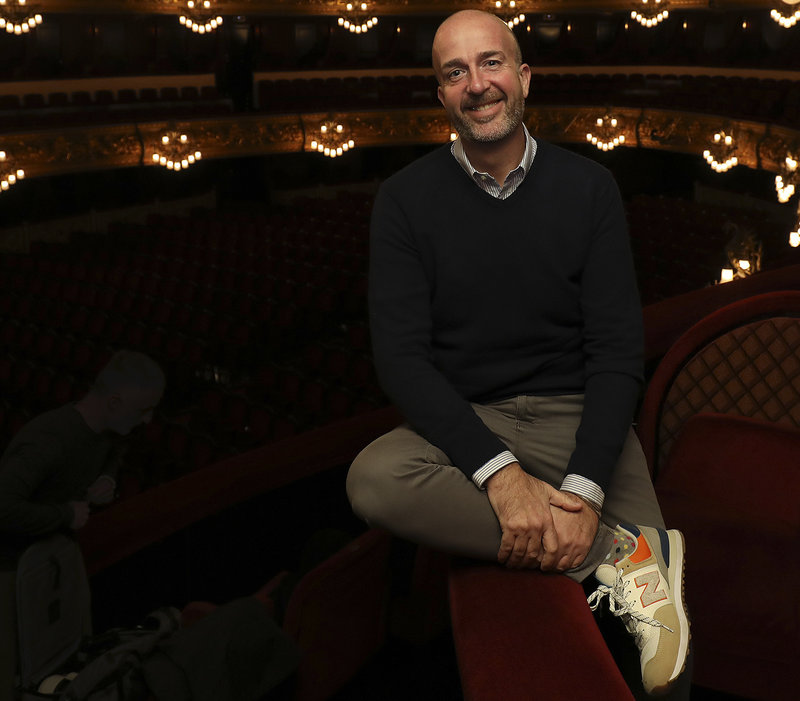A few months since becoming the artistic director of the Gran Teatre del Liceu opera house, Víctor García de Gomar (Barcelona, 1975) reveals some of the main points of his project going forward as he prepares to launch a new season on March 8.
You were appointed a year ago. Have your intentions changed much since now that you are actually doing the job?
No, but I did have to see, once here, whether the dream I proposed then was still possible. I continue believing it is, and the numbers support that dose of disruptive risk and boldness I spoke about a year ago. Opera is a genre that in recent years has been seen as a model of decadence, and a revolution is needed. The repertoire, marginal premieres, an unchanging public, the evolution of all that. This all makes me think that what is needed is for opera to become a living art, and we will try to achieve that through reflection, rethinking, and an update of dramatic composition. The Liceu has to learn how to connect with that public that sees it as something out of reach.
And how can that be done?
The only opportunity we have is updating the drama. Those unforgettable works that make up the canon have to genuinely touch on such issues as gender violence, the climate crisis, different ways of loving, depression and loneliness... They are subjects that opera has already dealt with, sometimes in a partial way and sometimes in a more complete way, and there is an option for amplifying them. The only way to connect with young people is with spectacle, great interpretations, and up-to-date subjects.
Is setting up a dialogue with the visual arts, for example what you did during your time at the Palau de la Música, a way of doing this?
The Liceu should not only be an opera house, but an academy of emotion and human passion. And to effectively achieve this, we will have authoritative voices from different disciplines that will help us to amplify the opera experience from poetic, scientific, visual, philosophic angles. Thus, we’ll try to make sure that there is at least one such piece every season. We’ll have, for example Wozzeck by Alban Berg, in a production from Salzburg with Matthias Goerne in the lead role, which will be a break from what the Liceu has done in the past few years. In a way, what is needed is to recover the impulse of that opera from the beginning of the 17th century in Florence with Monteverdi, in which all the arts come together and deal with today’s problems. If opera takes on the problems in the world today, and the public is capable of recognising it, it can become a manual for life.
Are the Liceu’s audiences ready for that type of experience?
Not only are they ready for it, it’s what they want. It is a different sort of invitation to the public to go from recognising to knowing. We need to recover the curiosity from those times in which the Liceu every year put on an opera by Verdi, Puccini or Wagner, after they had premiered only a year or two before. The capacity of those audiences to believe in the creators of their time has gradually been lost, and we have to try to reconnect them by looking for composers that use a language that can connect with today’s public. We are in a world in which the most successful painters, for example, are those capable of connecting tradition with what is most creative and innovative now, and that provides a a bit of a recipe.
The Liceu now has a production of ‘Aida’. How dependent is it on the great unavoidable works of opera?
On a menu of nine works of opera, three ballets and two or three symphonic concerts, we need three of them to be works that are well-loved by the public, that are part of the 25 works that make up the universal repertoire. That then lets us put on works from places 26 to 100, which are also extraordinary. As I said before, we need the public to come out their comfort zone and go from recognising to knowing. That means taking into account new creators who are enthroned in other theatres but who at the Liceu have still not had the opportunity to present a single work, such as Kaija Saariaho, Thomas Adès, Olga Neuwirth...
And what role do Catalan composers and singers play at the Liceu?
We want to have a sort of French idea of heritage, which means recovering distant works while at the same time fostering works of new creation. We are looking to recover traditional Catalan works, whether baroque, classical, or from the 19th century, every two seasons. We have already settled on a series of commissions of five composers for the next five seasons. And, as far as singers go, I can reveal that we’ll put on the Magic Flute, directed by Gustavo Dudamel, with Javier Camarena making his debut in the role of Tamino and [the Catalan singer] Núria Rial playing Pamina, in what will be her official introduction at the Liceu. It cannot be that she, along with Marta Mathéu, Xavier Sabata and Joan Martín-Royo, has no opportunity to appear at the Liceu.
What was the first time you fell in love with opera?
The first time always stays with you, and in my case it was Così fan tutte, in 1989 here in the Liceu, which coincided with the centenary of its premiere. For a long time I slept under the poster of that performance, which I bought that night. At school, instead of covering my books with pop stars, I had Brendel, Sokolov, Pavarotti and Kiri Te Kanawa. The other kids must have thought I was a freak, but for me it was normal.
interview

